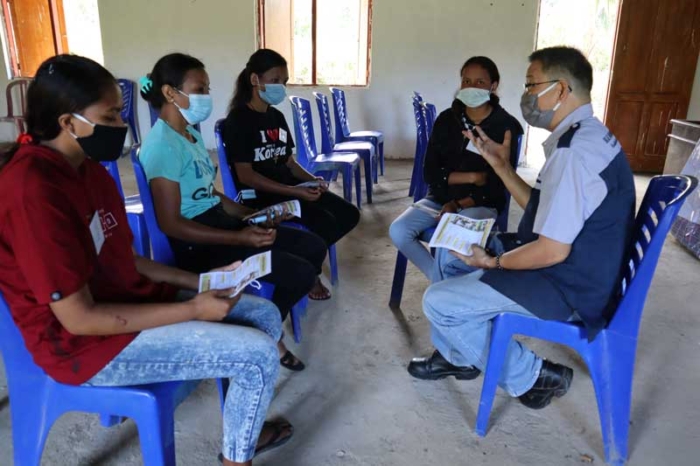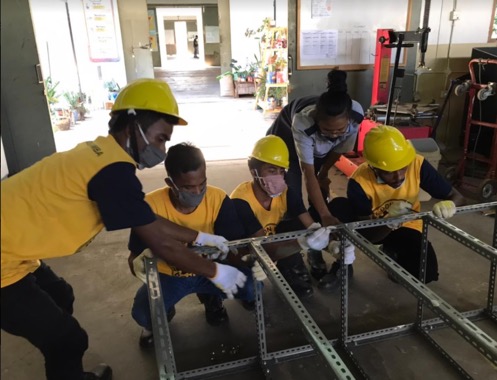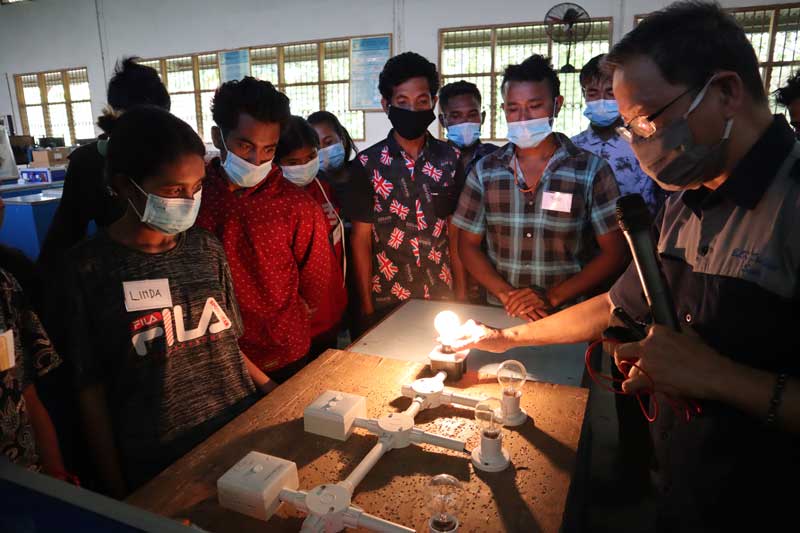MENTARI’s support for the solar PV power plant pilot project in Mata Redi village, East Nusa Tenggara province, included two training programs that began in May 2021. The first was on operating and maintaining a solar PV power plant and the second was on creative furniture making. Who participated and what did they gain from the training?
Jolinda Lubu Lena from Mata Redi village was excited when she first saw the announcement about the solar PV power plant training course. She realised that by joining the program she could learn to manage the solar PV power plant that the community has long been waiting for and help develop her own village.
The training presented a rare opportunity for Jolinda and other young people in the village – and especially for recent graduates from high school and vocational school or those who had to drop out of university. In the past, the youth of Mata Redi had little access to such courses and with MENTARI’s training programs also offering potential future employment, the courses were even more attractive.
Managing and maintaining the solar PV power system in the village requires skilled people and the local community needs to be fully involved to create a sense of ownership. The solar PV power plant will be the community’s responsibility in the future and this will guarantee the sustainability of the project.
One participant, Linda, is a graduate of the vocational high school, Kasimo Kererobo where she majored in computer and network technology: “I was born and raised in the village and I have never had light at home at night. In the evenings, I would like to continue studying, reading or accessing other entertainment. When I heard about this program and found out that the solar PV power plant was being built, it immediately piqued my interest. I want to help my parents and contribute to my village. Most importantly, I want my younger siblings to no longer study in the dark at night.”
Vina, another participant, expressed similar thoughts. She initially wanted to continue her studies at a university after graduating from senior high school in Waibakul but her parents asked her to defer for a year. While she was waiting, she registered for the training program and successfully passed the selection process.
Both Linda and Vina attended the training courses at Don Bosco training centre, Southwest Sumba in June 2021, along with the eight other selected participants – five men and five women, all from Mata Redi village. Although neither of them had any previous knowledge and understanding of electricity, they both agreed that they enjoyed the training materials. Vina explained, “It was initially challenging to keep up with the lessons. However, the lessons became more fun and quite enjoyable as time passed. In the electricity training, the female participants were competitive with their male counterparts. And in addition to the lessons [on electricity], we were also taught about discipline.”
Involving women in the training also encouraged a shift in attitudes within the Mata Redi community where people used to regard work in the electricity and furniture sectors as strictly for men. This serves as an inspiration for women’s groups in Mata Redi village to actively participate in these previously male-dominated domains.
Besides the three-month solar PV power plant training, MENTARI also ran a four-month furniture making training program for a group of young people. The aim was to improve their skills in creative crafts and furniture making. This will also boost livelihoods in the community.
Discussing the training, Dedy Haning, MENTARI’s demonstration project leader said: “The training program provided electrical training for PV systems and furniture making training, taught under the direct guidance of the expert instructors at Don Bosco training centre. The good news is that a total of 24 villagers applied, mostly youth. Still, we had to select just 10 participants (five male and five female) for the electrical training and 10 participants (seven male and three female) for the furniture making training.”
Ephrem Santos, Director of Don Bosco training centre, was one of the main training facilitators, he said: “This is in line with our vision and mission which is to produce graduates who excel in various types of expertise, so they can quickly find employment, thus reducing poverty and positively contributing to the community in Sumba.”
He admitted that there were some challenges in managing the potential and capacity of the participants. However, Don Bosco training centre takes a supportive approach and builds positive attitudes in entrepreneurship, critical thinking and creativity so the participants continuously grow and develop their skills.
The two training programs are fully funded by MENTARI. The participants receive a certificate and have the opportunity to work at village-owned enterprises in Mata Redi village and develop their business using the newly available electricity in Mata Redi.










